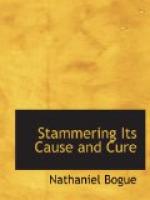At other times, when attempting to speak, my lips would pucker up, firmly set together, and I would be unable to separate them, until my breath was exhausted. Then I would gasp for more breath, struggling with the words I desired to speak, until the veins of my forehead would swell, my face would become red, and I would sink back, wholly unable to express myself, and usually being obliged to resort to writing.
These paroxysms left me extremely nervous and in a seriously weakened condition. After one of these attacks, the cold perspiration would break out on my forehead in great beads and I would sink into the nearest chair, where I would be compelled to remain until I had regained my strength.
My affliction was taking all my energy, sapping my strength, deadening my mental faculties, and placing me at a hopeless disadvantage in every way. I could do nothing that other people did. I appeared unnatural. I was nervous, irritable, despondent. This despondency now brought about a peculiar condition. I began to believe that everyone was more or less an enemy of mine. And still worse, I came to believe that I was an enemy of myself, which feeling threw me into despair, the depths of which I do not wish to recall, even now.
I was not only miserably unhappy myself, I made everyone else around me unhappy, although I did it, not intentionally, but because my affliction had caused me to lose control of myself.
In this condition, my nerves were strained to the breaking point all day long, and many a night I can remember crying myself to sleep—crying purely to relieve that stored-up nervous tension, and f ailing off to sleep as a result of exhaustion.
As I said before, there were periods of grace when the trouble seemed almost to vanish and I would be delighted to believe that perhaps it was gone forever—happy hope! But it was but a delusion, a mirage in the distance, a new road to lead me astray. The affliction always returned, as every stammerer knows—returned worse than before. All the hopes that I would outgrow my trouble, were found to be false hopes. For me, there was no such thing as outgrowing it and I have since discovered that after the age of six only one-fifth of one per cent. ever outgrow the trouble.
Another thing which I always thought peculiar when I was a stammerer was the fact that I had practically no difficulty in talking to animals when I was alone with them. I remember very well that we had a large bulldog called Jim, which I was very fond of. I used to believe that Jim understood my troubles better than any friend I had, unless it was Old Sol, our family driving horse.
Jim used to go with me on all my jaunts—I could talk to him by the hour and never stammer a word. And Old Sol—well, when everything seemed to be going against me, I used to go out and talk things over with Old Sol. Somehow he seemed to understand—he used to whinney softly and rub his nose against my shoulder as if to say, “I understand, Bennie, I understand!”




